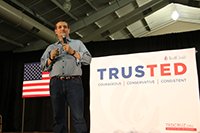Emerson beats other Iowa pollsters

Ted Cruz speaks at a rally in Iowa last weekend. The Emerson College Polling Society came closest to predicting Cruz’s win in the Republican caucuses. Photo/Meaghan Schaefer ’19
In an election that’s notoriously difficult to predict, the Emerson College Polling Society (ECPS) managed to nail the Iowa Republican caucus results more accurately than nearly everyone else, garnering the attention of poll and statistical analysis website FiveThirtyEight, among others.
Emerson had billionaire Donald Trump edging out Texas Sen. Ted Cruz by just one point, 27% to 26%, with Florida Sen. Marco Rubio a respectable third at 22%. Actual results had Cruz beating Trump, 28% to 24%, with Rubio in a close third at 23%.
The majority of Iowa polls predicted Trump winning handily.
Carl Bialik, writing on FiveThirtyEight, credited Emerson’s late polling for its relative accuracy, an analysis that ECPS advisor Spencer Kimball agrees with.
“We learned this lesson in 1948,” Kimball said, referring to the infamous “Dewey Defeats Truman” race, in which President Harry S. Truman won an upset re-election bid that foiled the Chicago Tribune’s front-page editors. “Everyone in the polling industry said you can’t stop polling the week before, because data shows voters don’t make up their minds until [the end].”
Kimball said if the Emerson students — who had polled into Sunday morning — had stretched it out to Sunday night, they would have had Cruz ahead of Trump.
The ECPS also got shout outs from KFMB AM 760 in San Diego, and Forbes opinion editor Avik Roy, an adviser working for the Rubio campaign.
Emerson wasn’t as close on the Democratic side. ECPS had former Secretary of State Hillary Clinton with an 8-point lead over Vermont Sen. Bernie Sanders, who in reality nearly tied Clinton.
The Democratic caucuses are far more difficult to forecast than the Republican ones, which last 20 minutes and are determined by popular vote, much like a primary.
Democrats allocate delegates proportionately, so a candidate’s viability threshold is determined by how many people show up. People can regroup multiple times during the hours-long scrums, which, because of their length, means sometimes people drop out before the end, so they’re not counted.
The ones who leave tend to be older, and older people this election cycle tend to support Clinton. Martin O’Malley supporters, on the other hand, tended to migrate to Sanders after it was clear their candidate was done.
And peer pressure can be a factor. In one location, Kimball said, Clinton supporters had to walk through a gauntlet of Sanders people to get to their group.
“There were people yelling at you,” Kimball recalled.
Emerson used automated polling in Iowa, as part of the school’s research into the methodology.
“Emerson is the only college in the country studying automated polling,” Kimball said. “Live polling is the gold standard, but it costs [several] times more than automated.”
The Emerson College Polling Society are trying to extend their streak in New Hampshire, and will release their results on NECN at 6 pm on Monday, February 8.
Categories